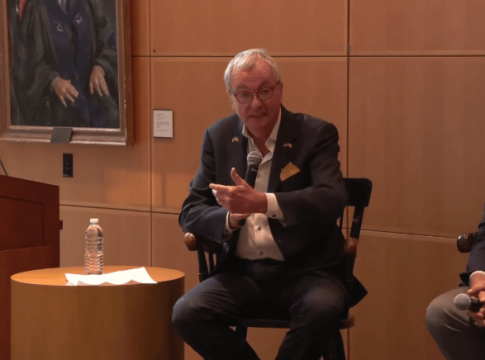Navigating the Uncertainties of AI: Insights from the AI State Leaders Conference
Artificial Intelligence on the Fast Track
As artificial intelligence (AI) continues to evolve at an unprecedented pace, leaders from various sectors are striving to tackle pressing questions about its impact on our lives. This discussion took center stage at the recent AI State Leaders Conference in Princeton, where experts convened under the leadership of Governor Phil Murphy to explore the challenges and opportunities presented by AI.
The Crucial Role of Public-Private Partnerships
Martin Svensson, the managing director at AI Sweden, highlighted a critical approach: collaboration between public entities and private companies. He emphasized that the hurdles faced regarding AI are universal, irrespective of the sector. By fostering open dialogue and concrete partnerships, stakeholders can better navigate the complexities of AI adoption.
“When both worlds come together in discussions, it facilitates progress,” Svensson stated.
Learning Through Action
John Bailey, a senior fellow at the American Enterprise Institute, underscored the urgency of proactive engagement with AI technologies. In his view, waiting for others to take the lead can leave organizations lagging behind as the technological landscape shifts rapidly.
“This isn’t just a technology to be studied; it’s one that demands hands-on experience,” Bailey remarked, pointing to the importance of states like New Jersey that are striving to spearhead collaborative AI initiatives.
A noteworthy example is the NJ AI Hub at Princeton, a partnership involving the state, Princeton University, and tech giants like Microsoft. This hub aims to unite researchers, industry leaders, and academic institutions to push forward on ethical AI use and workforce training.
Embracing the Unease of AI’s Potential
Despite the enormous potential of AI, apprehensions persist—even among leading tech influencers. Bailey shared that many executives are grappling with their own uncertainties about the technology and its implications.
“Creating powerful AI models brings its own set of unknowns,” he explained. “It’s perfectly normal to feel uneasy.”
Afua Bruce, a former US government official, added another layer to the discussion by stressing the need for developers to establish guidelines around what is acceptable versus harmful in AI usage.
“Generative AI presents unique opportunities, but we must ensure our ambition doesn’t compromise trust and individual agency,” Bruce warned.
A Call to Responsible Development
As we stand on the brink of this AI revolution, the call for responsible development and deployment of technology has never been more critical. By addressing ethical considerations and engaging in collaboration, we can shape a future where AI benefits society as a whole.
In conclusion, the insights gathered at the AI State Leaders Conference illuminate the path forward. As businesses and governments join forces, proactive engagement will be vital in navigating the transformative world of AI. The evolution of this technology is not just an isolated trend—it’s a societal shift that requires thoughtful stewardship.
For more updates on technology and business, stay tuned to NJB News Now.

Writes about personal finance, side hustles, gadgets, and tech innovation.
Bio: Priya specializes in making complex financial and tech topics easy to digest, with experience in fintech and consumer reviews.

